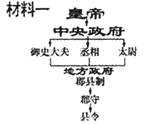问题
问答题 案例分析题
阅读材料,回答问题

材料二:
中国古代的中央集权制度,从其产生之日起,其组织机构就具有多民族、大一统的性质,其职能就具有维护、推动、发展和形成多民族、大一统国家的历史任务。如果这一制度被削弱,此国家准出问题。传统农业对水利有着更多的依赖,从大禹治水到清代多次治理黄河,无不集中了大量的人力物力,这是靠一家一户的小农无法实现的……秦凭借从中央到地方较为完善的统治机构,做到了“书同文”。文字统一对形成共同的文化认同和民族认同,对中国的民族融合、国家统一、疆域拓展、历史延续,都起着不可替代的作用。——摘自《凤凰网》
材料三:
“新英格兰出现的骚乱,我们商业上的不景气以及笼罩全国各地的那种普遍的低迷消沉情绪,在很大程度上(如果不是完全的话)归咎于最高权力机构的无权……”——华盛顿在1787年给友人的一封信
材料四:
中央对地方实行严格管理,国家官员在君主面前,永远只能处于被管理被驱策的地位,决不能按自己的意图或根据客观条件运用独立的治理权。——摘自《中国政治制度史》
依据材料三指出美国独立之初面临什么问题?是如何解决的?
答案
参考答案:
问题:中央政府软弱无能,无法稳定统治秩序,保护国家的利益与主权。
解决:召开制宪会议,制定1787年宪法;宪法规定实行联邦制。
